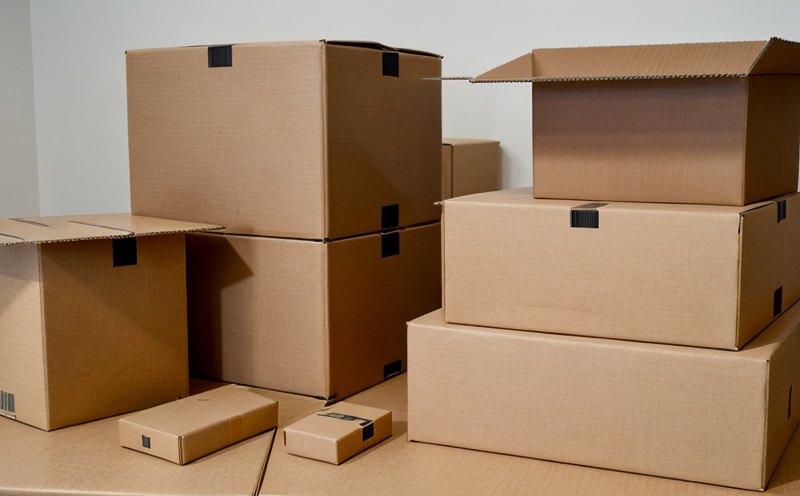Rigid Packaging Testing
When it comes to ensuring product integrity and safety in sectors such as food & beverage, pharmaceuticals, and electronics, rigid packaging plays a critical role. Rigid packaging is designed to protect the contents from physical damage, contamination, and environmental factors such as temperature, humidity, and pressure during storage and transportation.
Rigid packaging includes containers made from materials like metal, glass, plastic, or cardboard that are used for long-term protection of goods. These materials can be single-use or reusable, depending on the application. The testing of rigid packaging is essential to ensure it meets regulatory standards and performs its intended function effectively.
The process involves a series of tests aimed at evaluating the mechanical properties, chemical resistance, barrier performance, and overall durability of these containers. Testing ensures that they can withstand various stresses while maintaining their integrity. This includes crush testing to evaluate resistance to external forces, drop impact tests for assessing resilience against falls or drops, and seal integrity checks to ensure contents remain protected.
Accurate and reliable packaging testing not only enhances product quality but also supports compliance with international standards such as ISO, ASTM, and EN, which are widely recognized across the globe. By adhering to these standards, businesses can ensure their products meet both domestic and international requirements for safety, efficacy, and environmental impact.
Testing laboratories equipped with state-of-the-art equipment provide detailed reports that outline the results of each test conducted on a given rigid packaging sample. These reports are crucial tools for quality managers and R&D engineers who rely on them to make informed decisions about product design improvements or material changes.
Why Choose This Test
The decision to invest in rigorous testing of rigid packaging is based on several key considerations. Ensuring that your packaging meets the highest quality standards is paramount for maintaining consumer trust and satisfaction. By conducting comprehensive tests, you can identify potential weaknesses early in the development process or during production runs.
For instance, if a pharmaceutical company uses glass vials to store its injectable medications, they would need to ensure these vials are capable of withstanding the rigors of shipping without compromising the sterility of the product. Similarly, for electronics manufacturers packaging their devices in metal cases, it is crucial to verify that these cases provide adequate protection against electromagnetic interference and physical impacts.
Moreover, compliance with international standards such as ISO 12954 for food contact materials or ASTM D638 for mechanical testing of plastics underscores the importance of robust quality assurance protocols. These certifications not only enhance reputation but also facilitate smoother market access in different regions by meeting regulatory requirements.
In addition to safeguarding against costly recalls and lawsuits, thorough packaging tests contribute significantly towards minimizing waste and promoting sustainability efforts within organizations. By optimizing material usage through precise testing procedures, companies can reduce their carbon footprint while still delivering high-quality products that meet all necessary safety criteria.
International Acceptance and Recognition
The global nature of the packaging industry necessitates uniformity in quality standards across borders. International organizations such as ISO (International Organization for Standardization) have developed comprehensive guidelines to ensure that packaging meets rigorous performance criteria worldwide.
For example, ISO 10993-17 specifies biocompatibility evaluation methods specifically tailored towards medical devices stored or transported within rigid containers like glass vials. Similarly, ASTM D4258 provides specifications for determining the water vapor transmission rate through plastic films and sheets used in packaging applications.
Recognizing these international standards is not only beneficial from an operational standpoint but also facilitates better communication between stakeholders involved at every stage of product development - from raw material suppliers to end users. Compliance helps build credibility among consumers who expect consistency regardless of where they purchase their goods.
By adhering strictly to recognized standards, manufacturers can avoid costly non-compliance penalties and potential legal issues associated with substandard products. Furthermore, certification by reputable bodies like UL (Underwriters Laboratories) or TUV adds another layer of assurance that your packaging meets the highest industry benchmarks.
Use Cases and Application Examples
| Use Case | Description |
|---|---|
| Crush Testing of Metal Cans | This test evaluates the ability of metal cans to withstand external pressure without compromising their structural integrity. It simulates conditions found during shipping and handling, ensuring that contents remain protected even under extreme circumstances. |
| Durability Assessment for Glass Bottles | Glass bottles are commonly used in storing beverages like beer or wine. This test assesses the resistance of glass containers against physical impacts and temperature variations to guarantee they maintain their shape throughout distribution channels. |
| Seal Integrity Check on Plastic Jars | Plastic jars often contain products such as cosmetics or toiletries where leakage is unacceptable. This test ensures that seals remain intact during transit, protecting the contents from contamination and ensuring customer satisfaction. |
| Impact Testing of Cardboard Boxes | Cardboard boxes are frequently used for shipping non-perishable goods. Impact testing helps determine how well these boxes can withstand drops or collisions without causing damage to enclosed items. |
| Mechanical Strength of Metal Cases | When electronics manufacturers use metal cases, it's important to verify that they provide sufficient protection against external forces like bumps or knocks during transport. Mechanical strength tests assess the resilience of these protective enclosures. |
| Biocompatibility Evaluation for Pharmaceutical Packaging | Packaging used in storing medical devices must meet stringent biocompatibility requirements set forth by ISO 10993-17 to ensure that contact with human tissues does not cause adverse reactions. This involves conducting tests on various materials used in packaging. |
These examples illustrate just a few of the many applications where rigid packaging testing plays an indispensable role. Whether you're dealing with pharmaceuticals, electronics, or food products, ensuring that your packaging meets strict quality standards is crucial for protecting both your brand reputation and consumer safety.





